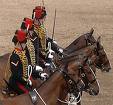Edward Charles Warde 1810 - 1875
May 10, 2009
 General Sir Edward Charles
Warde 1810 - 1875? was a British Cavalry officer in command of
the Royal Horse Artillery, Knight, Order of the Medjidie, Officer,
Legion of Honour, Knight Commander, Order of the Bath, fought at
Sevastopol
and he was a contributor to the 1st London Homeopathic
hospital.
General Sir Edward Charles
Warde 1810 - 1875? was a British Cavalry officer in command of
the Royal Horse Artillery, Knight, Order of the Medjidie, Officer,
Legion of Honour, Knight Commander, Order of the Bath, fought at
Sevastopol
and he was a contributor to the 1st London Homeopathic
hospital.
Edward Charles Warde was an ardent advocate of homeopathy (Marmaduke Blake Sampson, The concluding task of the disciples of homœopathy, an address by M.B. Sampson delivered at a general meeting of the British Homeopathic Association, together with a report of the proceedings of the meeting, (1849)), reporting that he had been an invalid for eight years, exhausting all the medications that Allopathy could offer, he became a patient of Frederick Hervey Foster Quin, and over a period of some months, regained his health completely.
Edward Charles Warde became a competent veterinary homeopathy himself, and he entrusted his military horses to the care of homeopathic veterinary William Haycock.
Edward Charles Warde explained that now married with four children, he regularly used homeopathic treatment for his family, lamenting the lack of homeopathic practitioners in Ireland, he recommended the homeopathic community to remedy this as soon as possible.
In 1851, Captain Warde consulted William Haycock, a homeopathic vet in Huddersfield, to attend one of his horses which, recovering from influenza, was now suffering from difficulty in breathing (S R Kirby (Ed.), The American Journal of Homoeopathy, Volumes 7-9, (C. G. Dean., 1852). Page 44). William Haycock treated the horse with arsenicum and sulphur and the horse recovered. Shortly thereafter, William Haycock was entrusted with the complete homeopathic management of all of the horses belonging to C Troupe, Royal Horse Artillery at the Leeds Barracks.
Captain Warde provided William Haycock with the following testimonial (Anon, The American Journal of Homoeopathy, Volumes 7-9, (C. G. Dean, 1852). Page 44):
“There were some acute and very dangerous cases, others of chronic character, and I have no hesitation in testifying to the perfect and complete success of your treatment under both circumstances.
“I have amply tested this system in my own stables for many years, and am perfectly satisfied of its vast superiority over the old mode of veterinary treatment in every way.
“You are at liberty to make any use you may think proper of this, and, I am, your sincere well wisher. E Warde Captain, Royal Horse Artillery, Woolwich, May 18th 1853.”
General Sir Edward Charles Warde was born in 1810. He was the son of Lt. Gen. Sir Henry Warde. He married Jane Lane, daughter of Reverend Charles Lane and Frances Catherine Sandford, on 24 August 1843 at Deal, Kent, England. General Sir Edward Charles Warde fought in the Crimean War, where he commanded the British seige train at Sebastopol. He was decorated with the award of Knight, Order of the Medjidie. He gained the rank of General in the service of the Royal Artillery. He was decorated with the award of Officer, Legion of Honour. He was invested as a Knight Commander, Order of the Bath (K.C.B.).
Of interest:
Sir Charles Edward Warde, 1st Baronet 1845 – 1937 was a Conservative Party politician in England who served as a Member of Parliament (MP) from 1892 to 1918.